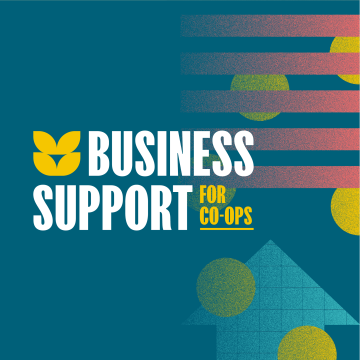3.2 Types of finance
This section helps you understand the types of finance you could consider when looking to start – or expand – your co‑op.
When your business starts, it is likely to require some form of cash injection in order to get the ball rolling so that the business can function before it makes a profit.
This cash injection may be in the form of grants and gifts, loans, community investment or even credit. For example suppliers may defer your payment of goods until you have used them to make a profit.
Whichever mix of finance you decide is appropriate, you should evidence this. This is especially helpful when applying for grant or loan applications or other instances where you're asking people to invest in your business. You need to prove your business is a worthy place for them to put their money.
Types of finance
We can present types of finance in two categories – non-repayable finance (money you do not need to pay back) and repayable finance (money you are expected to return).
Non-repayable finance
Re-invested surplus
Obtaining capital by drawing on the profits earned from trade in previous years is (at first sight) the most attractive way for any organisation to finance its growth, because:
- It does not have to be repaid
- No interest or dividend needs to be paid on the capital
- There is no need to negotiate terms with any external investor
However, there are limitations to this source of funds. It is of course only possible to raise capital to the extent of the surplus generated and not paid out to members and investors.
If the enterprise gives the impression of giving poor returns to members and investors, it may find it hard to attract more. There is also a danger that if large levels of unallocated reserves are built up, for example in a co-operative, it may tempt people to join the co-operative with the sole intention of demutualisation, or tempt existing members to discourage new members from joining.
Grants
Because co-operatives have social benefits both to their members and to the wider society, they may qualify for grants.
As with loans, there’s a huge variety of sources and types of grant, many restricted to particular kinds of business, category of people or geographical area.
Often grant providers are most interested in the impact that the funding will provide.
Repayable finance
Investment by members
- This can be in the form of shares if the appropriate legal structure is adopted, or by loans.
- There is a co‑operative principle which specifies that when a co‑operative member invests in the business there should be a limited return on their investment. This is on the basis that co-operatives should not operate with the primary aim of making profits for the payment of interest, dividends or bonuses on the money invested, deposited or lent to the organisation.
Loan finance
- Money can be borrowed from members in the form of loans, and it can also be borrowed from non-members. There is a vast array of sources of loan finance – from large institutions such as high street banks to small specialist organisations, including the co-operative’s members and their friends and relations.
- Loans can be short-term or long term, and the interest rate can also vary. Often this type of finance will be referred to as secured loans, in which the provider provides a loan against a certain asset that they have the ability to take ownership of and sell to recover the finance they offered. However, loans can also be unsecured where you repay it on an agreed basis, often with an agreed amount of interest on top. If you don’t repay the loan, the investor can take you to court to recover the debt.
- Wherever the loan finance comes from, a loan agreement should be drawn to specify the condition upon which money has been lent and will be repaid.
Other debt-based products
- Most other ways of financing a business are based on taking on debt i.e. finance that does not confer ownership of the enterprise.
- A bank overdraft, granted with permission from your bank, enables you to borrow an agreed amount of money on top of your bank balance as and when you need it. Permission can be withdrawn at very short notice however, and overdrafts often have high interest rates, so should be used sparingly.
- There are other, more obscure, ways of bringing funds into a business, such as invoice factoring. A business adviser can provide more information on such methods.
Choosing the right package of finance
It’s important to use each type of finance for the right purpose. For example, you should never use a bank overdraft, which may have to be repaid at short notice, to purchase a piece of equipment that you’ll need to retain in the business for it to survive.
There are a number of business advisors that can help.


